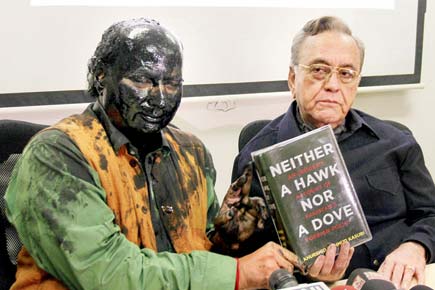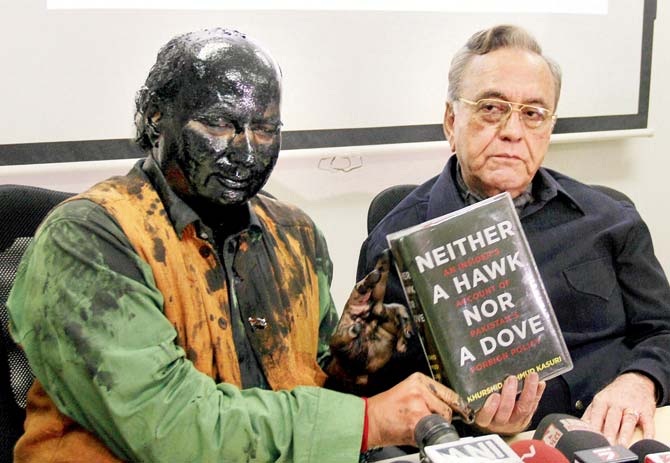These books might have kicked up a stir, but this columnist has kicked them straight into the bin

 Whereas most people make loud sucking noises while drawing up year-end lists — to ingratiate themselves and be included in the most boring book festivals in the cosmos — your columnist throws caution to the wind and these books into the dustbin. Why in God's name were these vanity projects published? And because they attract high-brow attention — over commercial fiction, which I endorse (though not necessarily read) because it subsidises ambitious writing — they deserve this low-brow take-down.
Whereas most people make loud sucking noises while drawing up year-end lists — to ingratiate themselves and be included in the most boring book festivals in the cosmos — your columnist throws caution to the wind and these books into the dustbin. Why in God's name were these vanity projects published? And because they attract high-brow attention — over commercial fiction, which I endorse (though not necessarily read) because it subsidises ambitious writing — they deserve this low-brow take-down.
ADVERTISEMENT
 Obviously the Shiv Sena did bad by pouring ink on Sudheendra Kulkarni, but all book lovers in the world should pour ink on the publishers of Khurshid Mahmud Kasuri's Neither a Hawk Nor a Dove — a very long, very dry and very unnecessary tree-killer. File pic
Obviously the Shiv Sena did bad by pouring ink on Sudheendra Kulkarni, but all book lovers in the world should pour ink on the publishers of Khurshid Mahmud Kasuri's Neither a Hawk Nor a Dove — a very long, very dry and very unnecessary tree-killer. File pic
Two Years, Eight Months and Twenty-Eight Nights by Salman Rushdie: Though his early books changed my life, he's proof that if you get a fatwa, your imagination gets shot to hell. The only good thing he's written in the past 25 years was his third-person autobiography, Joseph Anton. Yet every time he publishes a new novel, you look to it with anticipation. His latest was a dreary hodge-podge of old tricks. Stop writing, Mr Rushdie. Retire.
Flood of Fire by Amitav Ghosh: One of the smartest men alive can't write fiction for his life and should really stick to academic writing. No wonder this, the final instalment of the Ibis trilogy, flat and listless, tanked in the market. The only good novel he ever wrote was The Shadow Lines; otherwise his oeuvre is easily defined by its inability to engage, engross or excite. He has a vocal fan following, but for reasons entirely other than literary.
Fairy Tales at Fifty by Upamanyu Chatterjee: For the first 70 pages or so, I was telling my dwindling friends circle about the laugh riot that was Mr Chatterjee's latest. But then, inexplicably, it lost focus, humour and an engrossing narrative. It was as if he started with great enthusiasm, then left it for a while, and then had to somehow finish and get it over with. What a shame — perhaps some writers shouldn't do two jobs at the same time.
Political coffee-table books: I wonder which demented genius came up with this most abhorrent idea: take a dull neta and fill a book with his photos and an incoherent holding narrative. I'm thinking specifically of two books. One of Pranab Mukherjee, whose autobiography at the start of the year was banal, boring and merited a presidency-wapasi; his coffee-table book, by a senior journalist, features a new brand of English called Gibberinglish. The other book was of Sharad Yadav. Who wants to look at photos of Mr hand-glued-to-groin, much less read about him?
Neither a Hawk Nor a Dove by Khurshid Mahmud Kasuri: Obviously the Shiv Sena did bad by pouring ink on Sudheendra Kulkarni, but all book lovers in the world should pour ink on the publishers of this very long, very dry and very unnecessary tree-killer. Yes, he was Musharraf's foreign minister at a time that India and Pakistan nearly clinched a peace deal, but whatever this book says could have been said in an Op-ed or three.
The Chinar Years by ML Fotedar: Good God, what persuaded this dinosaur to write a book that perhaps ought to have been written 15 years ago? That it tanked in the market is proof of the Congress party's decline. And furthermore, he is known as one of Delhi's biggest liars, so you can't believe anything in here (unless you're an over-the-hill political reporter). His rah-rah-rah for Priyanka Gandhi Vadra seems nefarious, dubious and smacks of ulterior motive. Whoever chose to publish this should be given the death penalty.
India: The Crucial Years by TV Rajeshwar: Another example of why exemplary punishment is not enough for publishers who go after retired bureaucrats and senile politicians for their hoary memoirs. This former Intelligence Bureau chief and governor of Uttar Pradesh ought to have something interesting to say. But no. It's obvious that memoirists in India are too scared to pen anything controversial. And they can't write for nuts. In contrast is the most excellent Kashmir: The Vajpayee Years, by a former spy chief and co-authored by Yours Truly, which is proof that if you wish to write something worthwhile, get a good co-author who can bully you a bit.
On My Own Terms: From the Grassroots to the Corridors of Power by Sharad Pawar: This book is the equivalent of Mr Pawar wringing his tear-soaked towel from all the weeping over the years because he couldn't become prime minister in 1991. We already know that story, chunky. And if that's what constitutes the headline for this book, then imagine what an utterly useless book this is — by a man who, had he chosen to, could have revealed so much about money and politics, Mumbai and crime, property and the parallel economy. What an opportunity missed. And I'm still stunned that Mr Pawar thanks a great writer like Jerry Pinto in his acknowledgements. Why, Jerry, why?
(Next week: My best reading in 2015)
Journalist and writer Aditya Sinha is the co-author of Kashmir: The Vajpayee Years. He tweets @autumnshade. Send your feedback to mailbag@mid-day.com
 Subscribe today by clicking the link and stay updated with the latest news!" Click here!
Subscribe today by clicking the link and stay updated with the latest news!" Click here!







